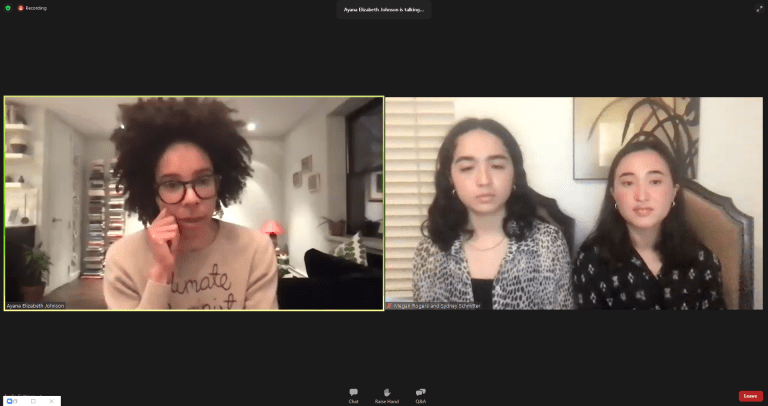“If environmental justice is a field, then we lose,” Ayana Elizabeth Johnson told attendees of the ninth annual Stephen H. Schneider Memorial Lecture on Thursday. “We have to include justice in our work, no matter where we work, or what we call it.”
Johnson co-created the Blue New Deal, which aims to emphasize the ocean in climate change policy. At the talk, she stressed that environmental justice, a field which studies how environmental burdens impact marginalized communities, can’t be separated from the more general climate movement.
“If we leave people of color out of the climate movement we will simply fail,” she said. “There just aren’t enough smart people with good ideas doing the work.”
Johnson cited a poll from Yale and George Mason Universities which shows that people of color show greater support for policies to reduce greenhouse gas emissions. She pushed back on the idea that climate justice and racial justice are exactly the same thing.
“Obviously there’s overlap,” she said. “There are some racial justice issues that have nothing to do with climate, and climate issues that have nothing to do with race.”
Johnson is the founder and CEO of Ocean Collectiv, a consulting firm focused on conservation. She also founded Urban Ocean Lab, a think-tank which published a policy memo last year, with several recommendations to promote the construction of offshore wind turbines.
At the talk, which was co-hosted by the Woods Institute for the Environment and Students for Sustainable Stanford, Johnson called for the government to reform the process to permit the construction of these offshore turbines. Urban Ocean Lab’s memo also recommends that the federal government create tax incentives for offshore developments and ensure that communities which host such developments also receive a share of the benefits.
Johnson sees the ocean as a way to address the country’s agricultural needs, in addition to its energy needs. She promoted the idea of regenerative ocean farming, which allows the harvest of seaweeds, clams and other seafood, without the need for pesticides, fertilizers or fresh water.
“We have an opportunity to think about how to eat from the sea in a really sustainable way,” Johnson said.
When asked how she first got involved in environmental policy, Johnson said she views her work as a three-circle Venn diagram. She believes people should aim to work at the intersection of what skills their community needs, what skills they know and what brings them joy.
“I encourage everyone I know to literally draw the circles and see what’s in the middle,” she said. “I think so often we just assume that we can’t have all those things the same time, because we haven’t really thought through what that even is.”
